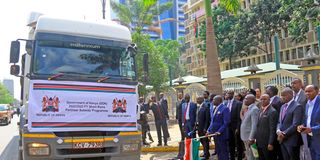Money ideas to ease pressure on tax

Deputy President Rigathi Gachagua flags off of DAP subsidised fertiliser to various regions of Kenya. I hear people talking about cheap fertilizer but you have to look for it like a bride and involve chiefs. If you stabilised the producer prices, if the cost of inputs was reasonable, I’d grow lots of maize at least two seasons a year, not necessarily to make money but to contribute to feeding the nation.
When you get to 50 and start eyeing your pension longingly and dreaming of the white beaches of Bali where no one knows you and you can let the old white hair down, you realise that you have been locked in this Matrix-like slavery with the government in which you generate income, the government takes it and feeds fake pictures into your cerebral cortex.
The level of taxation in the formal sector should be an electoral issue going forward. The political class, its tenderpreneurial tentacles, buccaneers, oligarchs and political operatives pay little or no tax. A bit of what is hacked out of your pension ends up in massage joints in the Gulf, vanity projects for trophy companions, conspicuous consumption and mindless, embarrassing public displays of generosity.
Since there is little appetite for controlling the furnace-burning cash in Kenya, in any case, I have no desire to get in more trouble with the prophetry, let me focus on “feed the cow” common-sense activities we could get into in the short-term to make more money and therefore reduce the need to levy higher taxes on wage slaves.
First, is livestock. Kenya has significant herds of cattle, 21.7 million animals, the fifth largest in Africa, after Ethiopia (70 million) Chad, Sudan and Tanzania. But it is the 9th largest producer of beef, only 244.2 metric tonnes. South Africa leads with 1038.7 metric tonnes of beef in July 2022, numbers from Business Insider.
I think we are putting our animals in ships and sending them to the Gulf. I suspect the folks in the Gulf slaughter the animals and export the beef to Europe and make a tidy sum after giving us crap money. I think the Kenya Meat Commission should be strengthened, and our affairs with the Europeans regularised to open the way for meat exports and the export of live animals restricted in order to improve the value of exports.
Second, we need to pay serious attention to tourism, especially beach tourism, in established areas and extending into Kilifi and Lamu. We should end the highly organised land theft cartels at the Coast to encourage development. We should pump money into rehabilitating and restoring our beautiful hotels whose service is second to none on this continent.
You can start by putting the money in your own hotels, who cares so long as they are bringing money and paying taxes? Get Mohamed Hersi in a room with some of his tourism colleagues and let them figure out a practical tourism recovery plan behind which money can be put. I think the same folk can volunteer to do marketing for their destinations.
War of attrition
And get serious about managing wildlife sustainably. But even more important is to deal with Somalia. The war of attrition with al-Shabaab is destroying our country; if we can’t win outright, then maybe we should debate a deal.
Third are the traditional cash cows which have atrophied: horticulture, tea and coffee. There is a lot of hot air and wild goose chase in the management of our agriculture. Vietnam ate our lunch by growing our coffee using our own scientists.
Entrench the coffee reforms, wipe out the cartels, convince me to rehabilitate my father’s stumps and plant another three acres of the finest arabica in the world. Let’s bump up the production.
The problem with tea is the greed of some of those who have been milking small-holder farmers for years. The solution is to ensure stability: clamp down on the coups, support the management team now in office to modernise, digitalise and transform the Kenya Tea Development Authority, its system of companies and farmer-managed units into an efficient, 21st-century production, marketing and branding machine for our tea, capable of deepening existing markets, opening new ones and innovating new lines of products.
Finally, we cannot be importing guns and food; what is stopping us from growing what we eat? I can put up to 200 acres under maize next season. But how can I do that if a 50kg of CAN for top dressing, which is what we are doing now, costs Sh5,700 and I will have to sell a bag of maize for 3p? So I confine my farming to the small acreage I own and for which I can afford inputs.
I hear people talking about cheap fertilizer but you have to look for it like a bride and involve chiefs. If you stabilised the producer prices, if the cost of inputs was reasonable, I’d grow lots of maize at least two seasons a year, not necessarily to make money but to contribute to feeding the nation, putting in the market safely, wholesome food and protecting our future from seed-destroying GMOs.
I think horticulture farmers are the aristocracy of Kenyan farming. They are wealthy, knowledgeable and world-travelled. Two things the government can do for them: give them energy at cost and allow them to put their flowers on any aircraft they damn well, please.
As a matter of fact, if the government subsidised energy costs, opened up air freight choices and smoothed the way to new markets, our flower farmers will not only pump more money into the economy from their local farms, but they would start others in the region. Throwing money around is great but in the end, it has to come from somewhere.





